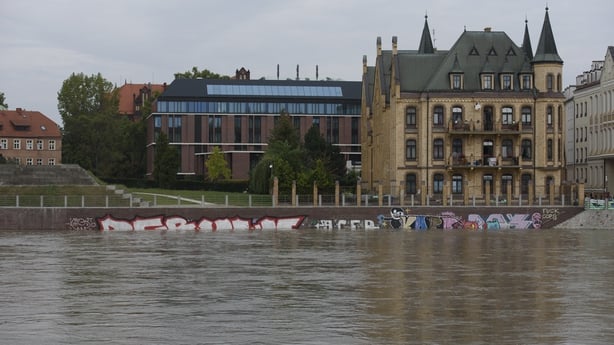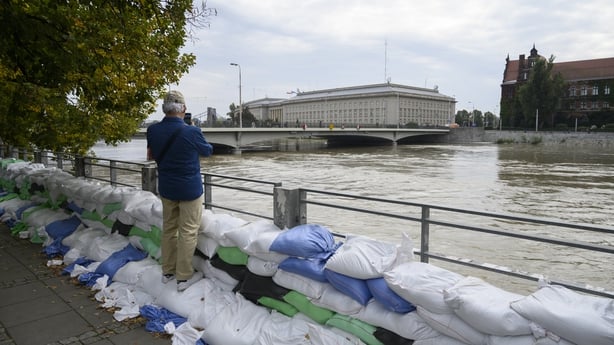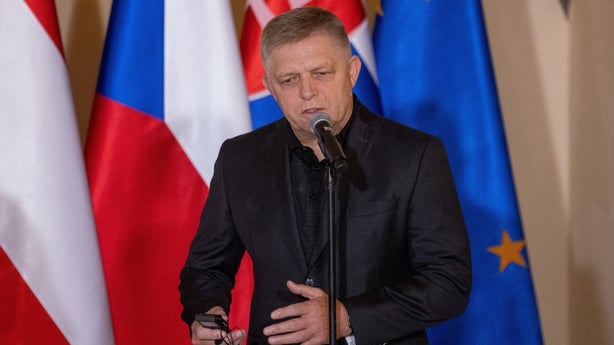On Thursday morning, residents of the southwestern Polish city of Wrocław awoke to find that the level of the Oder river, which flows through the city, had risen to 6.3 metres and was forecast to rise steadily throughout the day.
Four days after Storm Boris had unleashed heavy rain and flooding that devastated scores of towns in southern Poland and northern Czechia, as well as parts of Austria, Slovakia and Romania, floodwaters continued to raise the levels of the region's rivers.
In Wrocław, locals had prepared for the worst.
The Polish army, emergency services and thousands of residents had spent the previous two days filling sandbags and re-enforcing flood defences in the city and throughout its suburbs.
Sandbags were stacked at the doors of businesses and churches in the hope of stopping the kind of flooding that had devastated the city during a previous flood in 1997.
I arrived into the city on Wednesday evening to find locals standing on the city's bridges and observing the depth of the Oder.
Hundreds of volunteers had assembled earlier that day at the city’s zoo to build a wall of sandbags around its perimeter and prevent any potential flooding reaching the animals.

The same communal spirit and well-organised response to re-enforce flood defences took place in towns and cities across southwestern Poland.
Polish Prime Minister Donald Tusk and senior cabinet ministers had encamped in Wrocław since Monday to coordinate relief efforts with local officials. Their morning crisis meetings were broadcast live at 7am each morning on the Polish national television.
In Stabłowice, a northern suburb of Wroclaw, floodwater had started to seep onto roads and submerged allotments, but luckily it had not reached homes. Thousands of sandbags were stacked outside blocks of flats and shops.
By that stage, most locals I spoke to thought that a repeat of 1997 was unlikely.
In the historic centre of Wrocław, the Oder continued to rise slowly but remained at a "stable" level, according to the mayor.
At the city’s football stadium, which hosted matches during Euro 2012, hundreds of volunteers continued to fill thousands of sandbags for the city’s residents to come and collect.

Among the volunteers stacking and carrying sandbags were Polish climate activists.
"It’s September. We used to have floods in July and August," Marek Józefiak, spokesperson for Greenpeace Poland, told RTÉ News.
"This is happening at 1.5 degrees of climate change. What’s going to happen if we exceed two degrees or worse?", said Mr Józefiak.
Poland's recent extreme weather, he said, has been caused by rising global temperatures and political inaction to tackle climate change.
Julia Keane, a 20-year-old Irish-Polish dual citizen from Warsaw had travelled to Wrocław to help with relief efforts at the stadium and elsewhere in the city.
"This flood is basically something we were protesting about," said Ms Keane, who is an activist with The Last Generation, a climate action group that protests against fossil fuel emissions.
"This is definitely a trigger point. Politicians need to be aware that they are fueling the climate crisis".
Ms Keane said that she and other activists from the group intend to keep helping relief efforts in the coming weeks in areas that were badly flooded.
The clean-up operation in southern Poland and the region’s other flood-affected countries will continue for weeks and even months, such is the scale of the damage caused by flooding.
A Polish colleague who had made it to Kłodzko, a town that was submerged by floodwater last Sunday and Monday, told me that "it was like a war zone".
Streets in the town are now covered in a thick layer of mud.
Some peoples’ homes in Kłodzko were flooded up to the height of the ground floor ceiling, and, in some cases, floodwater reached the first floor of houses.
Reconstruction of damaged roads and bridges, businesses and people’s homes will be costly.
The European Union’s response to the crisis has been swift.
European Commission President Ursula von der Leyen’s visit to Wrocław on Thursday afternoon delivered not only words of solidarity but an enormous aid package for four of the region’s flood-affected countries.

The €10bn in funding, pledged by Ms von der leyen, was much more than had been predicted.
It also appeared to be greatly appreciated by the leaders of Austria, Czechia, Poland and Slovakia following their 45-minute meeting with the Commission President in Wrocław's city hall.
Normally, relief funding for natural disasters is issued through the EU's Solidarity Fund.
But Ms von der Leyen said that that method was "not sufficient" to rebuild the amount of damaged infrastructure.
Instead, EU cohesion funds, a mechanism used to reduce the wealth divide between EU member states, will be used.
The €10bn funding package can be used for immediate relief efforts, for pre-financing of projects and will be made up entirely of EU funding, rather than co-funding by member states.
Ms von der Leyen called it an "unusual mechanism", but said that "extraordinary times called for extraordinary measures".
Poland will receive €5bn of the €10bn in EU cohesion funding, meaning that a large majority of the relief and reconstruction costs in the country will be covered by EU funding.
The Polish government has also pledged more than €400m for reconstruction efforts.
That kind of financial aid and support will make it harder for eurosceptic parties in Poland and Slovakia to bash the EU for the time being.
Robert Fico, the populist prime minister of Slovakia who survived an assassination attempt last May, was one of the four regional leaders to meet Ms von der Leyen in Wrocław.
Mr Fico's coalition government has clashed with the Commission in the past year over new media laws and its scrapping of an anti-corruption office. Yet, he welcomed the funding announcement by Ms von der Leyen, calling it "a perfect short meeting with excellent results".
EU funding will help the region to clean up the destruction from this week's natural disaster and rebuild in the short term.
But Polish climate activists I spoke to want their government to take tougher policy decisions now to reduce emissions and tackle the climate crisis.
Only last week, one-third of Polish rivers were in a drought state following a summer of very high temperatures across the region.
Whether this week's extreme weather will act as a turning point for the way governments in the region approach climate policy remains to be seen.








